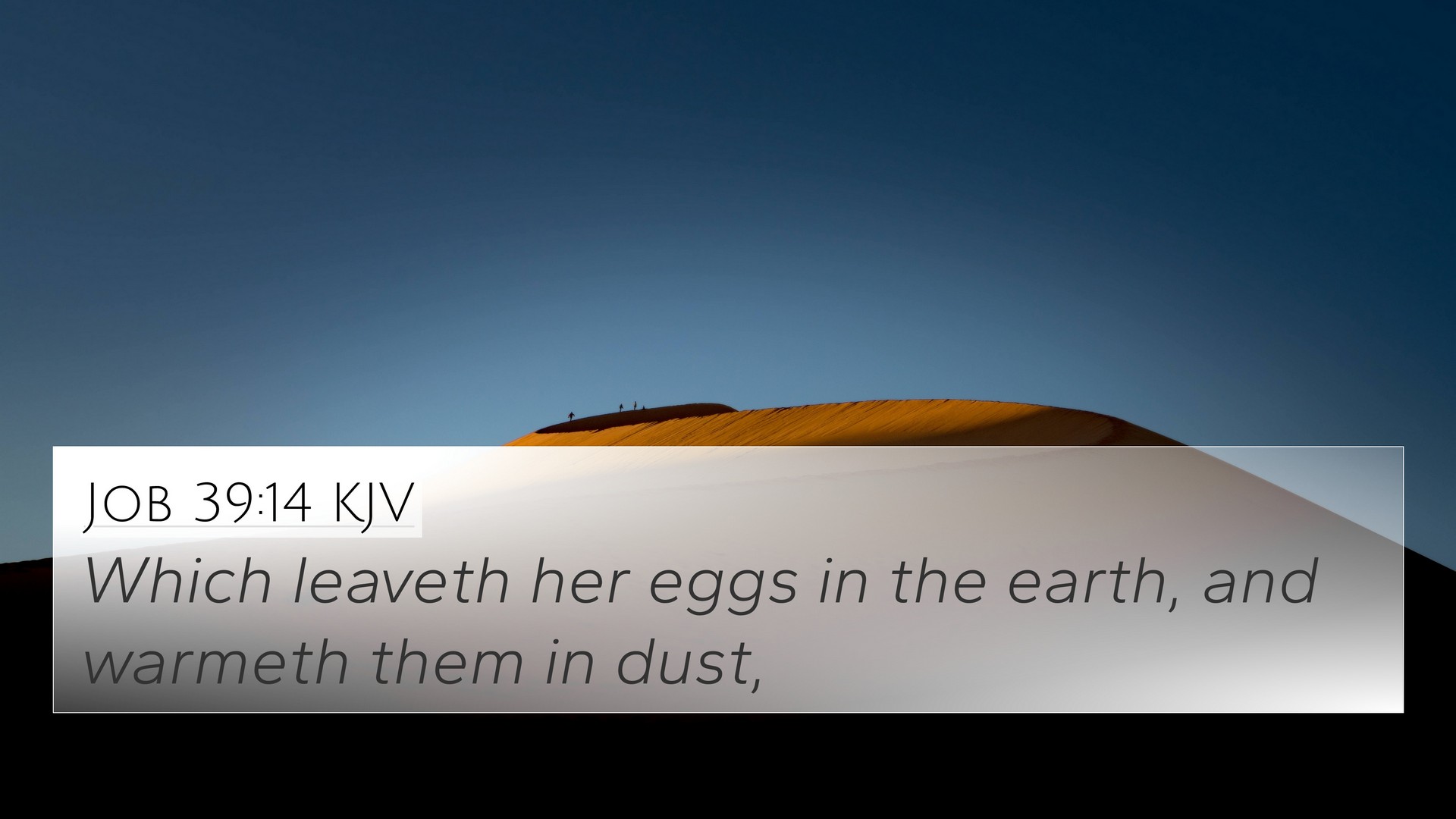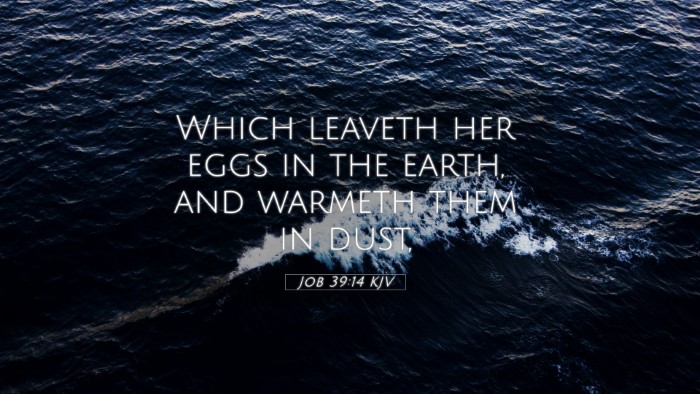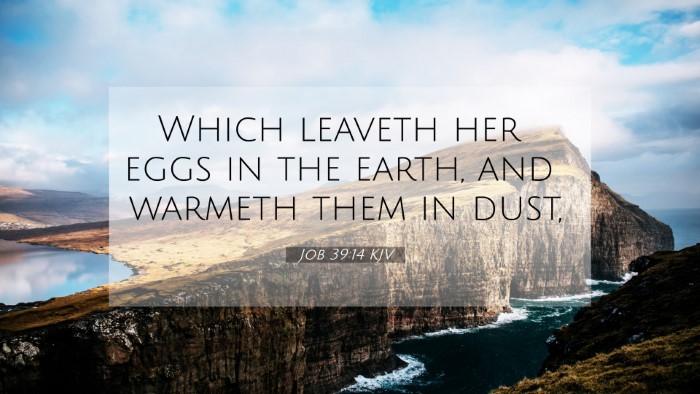Old Testament
Genesis Exodus Leviticus Numbers Deuteronomy Joshua Judges Ruth 1 Samuel 2 Samuel 1 Kings 2 Kings 1 Chronicles 2 Chronicles Ezra Nehemiah Esther Job Psalms Proverbs Ecclesiastes Song of Solomon Isaiah Jeremiah Lamentations Ezekiel Daniel Hosea Joel Amos Obadiah Jonah Micah Nahum Habakkuk Zephaniah Haggai Zechariah MalachiJob 39:14 Similar Verses
Job 39:14 Cross References
Which leaveth her eggs in the earth, and warmeth them in dust,
Uncover the Rich Themes and Topics of This Bible Verse
Listed below are the Bible themes associated with Job 39:14. We invite you to explore each theme to gain deeper insights into the Scriptures.
Job 39:14 Cross Reference Verses
No cross reference images were found in our system for this Bible passage.
Job 39:14 Verse Analysis and Similar Verses
Understanding Job 39:14
Job 39:14 states: "For she leaves her eggs on the ground, and warms them in the dust." This verse provides a vivid illustration of the behaviors of the ostrich, a creature that Job describes to highlight a larger theme of divine wisdom and creation.
Commentary Insights
This verse can be understood through various lenses provided by public domain commentaries:
- Matthew Henry: Henry notes that the ostrich's neglect of her eggs symbolizes foolishness and a lack of maternal instinct, contrasting with the wisdom displayed in God's creation. This serves to remind Job of the limitations of human understanding when compared to God's sovereignty over nature.
- Albert Barnes: Barnes emphasizes the peculiar nature of the ostrich, pointing out its singular behavior of laying eggs in the sand, which exposes them to danger. He interprets this as symbolic of humanity's own vulnerabilities and the sometimes perplexing nature of creation.
- Adam Clarke: Clarke provides a theological angle, explaining how the ostrich, while seemingly careless, has a role in God's design. He discusses the broader implications of God using even the least responsible of creatures to fulfill His purposes.
Thematic Connections
The thematic explorations in this verse connect well to key doctrines and narratives across Scripture:
- Parental Care: The juxtaposition of the ostrich's behavior can lead to reflections on parental care found in Psalm 127:3-5, where children are described as a heritage from the Lord.
- God’s Sovereignty: The mention of the ostrich’s unique behavior highlights God's sovereignty, as seen in Job 38:41, where God questions Job about provision for the animals.
- Wisdom of Creation: The wonder of creation and God’s wisdom is echoed in Proverbs 30:18-19, where the mysteries of nature invoke a sense of awe.
- Human Limitations: Job 39:14 illustrates the concept of human limitations, similar to Isaiah 55:8-9, where God declares His ways higher than our ways.
- Vulnerability: Just as the ostrich's eggs are vulnerable, 1 Peter 5:8 warns believers about being alert to adversity and spiritual dangers.
- Biblical Imagery: Various instances in Matthew 23:37 use maternal imagery to describe God's protective nature, contrasting with the ostrich's lack of care.
- New Testament Reflections: The discussion of care and concern is also seen in Luke 12:6-7, where even sparrows are not forgotten by God.
Cross-Referencing Biblical Texts
Job 39:14 serves as a pivotal connection point for exploring various themes through Bible verse cross-references. Below are key references:
- Job 38:41 - God's provision for animals.
- Psalm 104:27-28 - The dependence of all creatures on God.
- Proverbs 30:29-31 - Descriptions of creatures that exhibit strength.
- Matthew 6:26 - God's care for the birds and by extension, all of creation.
- Luke 12:24 - A reminder of God's provision in nature.
- Isaiah 40:31 - Those who hope in the Lord will renew their strength, linking back to strength found in creation.
- Matthew 23:37 - The metaphor of a hen gathering her chicks, contrastingively illustrating proper care.
- Ecclesiastes 3:1-2 - Themes of time and purpose in creation.
- Genesis 1:25 - Creation culminating in very good, referencing the animal kingdom's role.
- James 1:5 - God’s wisdom being freely given to those who ask, paralleling human understanding versus divine understanding.
Conclusion
The commentary and thematic connections surrounding Job 39:14 encourage deep reflection on the nature of creation, wisdom, and the contrasts between divine understanding and human folly. This verse not only enriches one's study through cross-referencing Biblical texts but also serves to illuminate God's design in all aspects of life.
Tools for Bible Cross-Referencing
For those interested in exploring bible cross-reference guides and resources, various tools can facilitate deeper study:
- Bible Concordance - Useful for locating specific words or themes across scripture.
- Cross-reference Bible Study - Involves systematically analyzing verses that relate to each other.
- Bible cross-reference system - Organized methods to track thematic links.
- Bible chain references - A technique for following connected verses throughout both testaments.
- Comprehensive Bible cross-reference materials - Various editions and tools available for different reading preferences.


